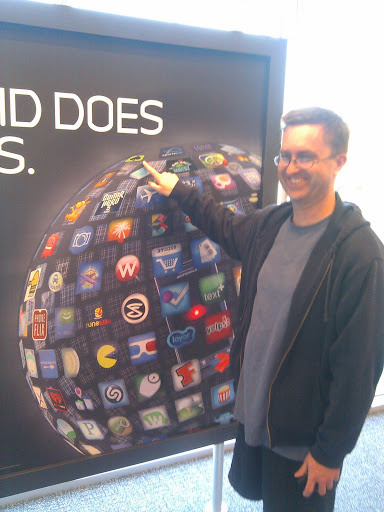This week another Android success story is making the rounds. Android dev Arron La, maker of Advanced Task Manager,
posted his revenue figures for the app. Looks like he made about $18K last year and about $80K this year from a combination of paid sales and ad revenue through AdMob.
I've posted stats before (
here's a review of 2009). In the spirit of sharing some hard numbers and getting the word out about Android as a viable platform for devs, especially independent ones, I'm going to share some more extensive stats through the end of July 2010.
First of all, I uploaded my first app to the Android Market in March of 2009. That was a tip calculator called
TippinTime that was free, with no ads. I learned the platform by building simple, niche-oriented calculators and simple novelty apps, eventually working my way up to more complex games like
Spades,
Dominoes, and the newest app,
WordWise. Polyclef currently has 31 apps on the market, with a mix of monetization methods, including paid sales and free ad-based apps. I also serve as publisher for EasyTether, an app by a developer who is currently unable to publish paid apps directly through the Android Market. For most of these apps, I'm the sole developer, though I occasionally contract out artwork and music for games, and on rare occasions some coding. With WordWise, my friend and co-developer has done all the server-side implementation, while I've been responsible for the client.
Here is a summary chart of revenue from March 2009 to July 2010, broken down by the relative contribution of ad revenue and paid sales:

Ad revenue has been decreasing as the overall percentage of revenue. I don't understand all the factors related to ad revenue (they're generally not made available to devs). Ad revenue tends to decrease during the summer months, but that doesn't completely explain things, especially since the number of both impressions and clicks has continued to grow significantly, while actual revenue from ads has fallen. I'm hoping that turns around in the Fall.
But the general trend is obviously up, and average monthly revenue this year is a little over $8K. As long as revenue either continues to grow or levels off, I'm on target to make six figures this year as an independent Android developer.
Not bad. It's obviously beyond what I expected when I started doing this last year to earn a little extra dinner money as a grad student. Now I'm taking time from the program to pursue this full-time.
Just another data point to drive home that Android is definitely a viable platform for indie developers. Unlike La's example or
Edward Kim, my strategy is very diverse, with lots of apps and several different ways to monetize.
Although, just as in the app market itself, my own apps follow a long-tail distribution. That is, a few of my apps make a lot of money, while most of my apps make very little.
Right now my own top earners are Dominoes, Golf Solitaire, and WordWise. Here are some screenshots of the portal stats:



As you can see, ratings and active install rates tend to be lower for free versions. I think people have a lower perception of value when they get something for free, and thus the lower rating. I've tried different price points for most of my apps, typically ranging from $0.99 to $2.99 for these three apps. Right now I've settled at $1.99 for the first two, though WordWise is currently at $0.99 because higher price points seem to significantly negatively impact sales, and we're trying to stay in the top ten in Paid>Brain & Puzzle.
Most of my paid apps tend to have active install rates between 70-80%, which I believe is actually quite good, comparing it to what I hear in various forums from other devs.
None of my individual apps have broken into the upper echelon (e.g. >250K downloads), but many have been well-ranked and well-rated. Dominoes, Golf Solitaire, and WordWise are all in the top 10 in their respective subcategory, though the free versions have not cracked the upper rankings.
I've dabbled some in iPhone development as well, though I have not enjoyed comparable success there. The iPhone version of WordWise will be submitted this week though, allowing cross-platform play between Android and iPhone users, and I'm hoping it will be at least a moderate hit.
In any case, this is just some companion info to go along with La and Kim's anecdotes. I still come across threads where people say that Android, while growing as a platform, is still unproven when it comes to making money. Consider this another case study from someone who is now doing this full-time and making a good income.
If you can churn out a single hit, that's great, though the strategy that's working for me so far is diversification. I think in the long run it will end up being a more robust strategy (i.e. if Google makes some core improvement to Android that makes your app obsolete, you're kind of out of luck). I don't know what the future brings, but with Android adoption continuing to explode, I'm obviously optimistic.





























